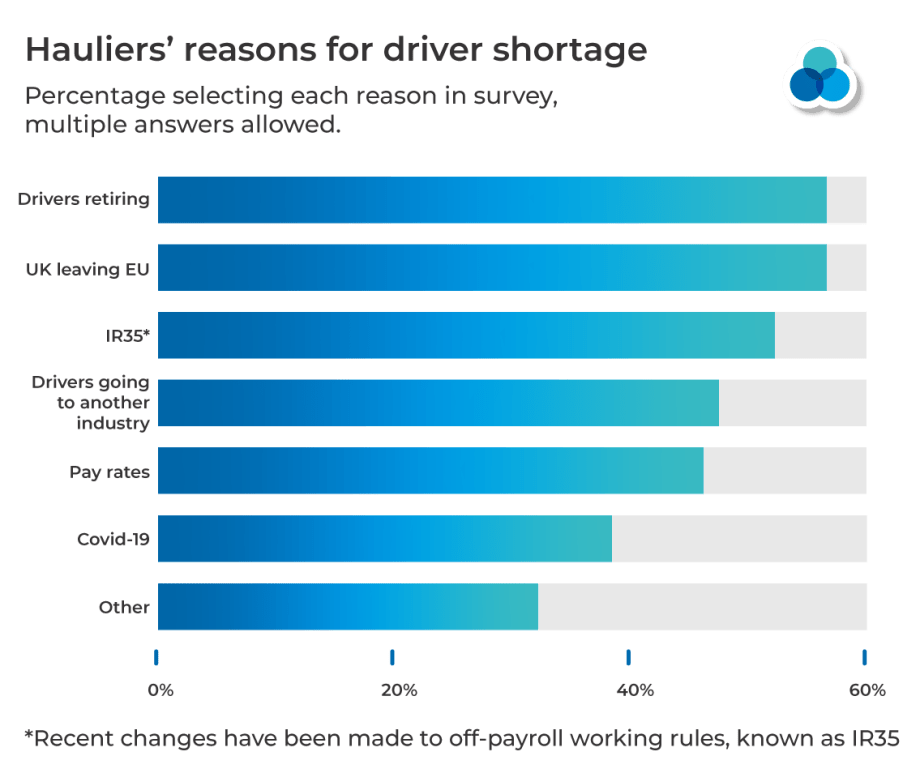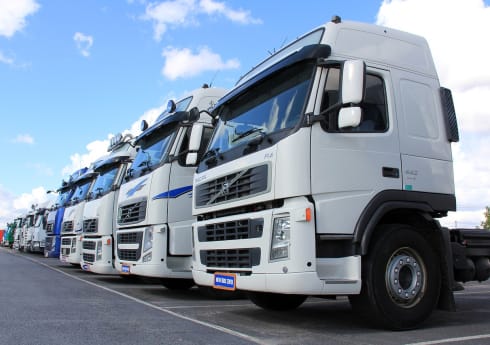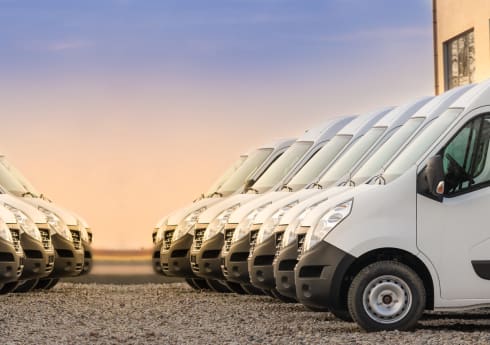Why is there a lorry driver shortage? What can I do to hire the drivers I need?
It’s been impossible to miss the media attention given lately to the UK’s shortage of lorry drivers. Industry insiders, however, know that this crisis has been building up for years and the impact of Brexit, Covid and a few other recent changes have only been the icing on the cake.
In this article we analyse
- The reasons for the HGV driver shortage in Britain
- The measures our government is taking to address the problem
- How likely they are to work
- What you as an employer can do if you’re struggling to recruit truck drivers for your business.

How bad is the problem?
We need 100k more truck drivers
There is now a shortage of more than 100,000 drivers in the UK, out of a pre-pandemic total of about 600,000. These are the figures that came out recently when the Road Haulage Association conducted a survey of its members.
Even before Covid, the estimated shortage was about 60,000 drivers, the BBC reported in a recent article.
Hiring takes many weeks
Less than 15% of hauliers managed to hire their latest recruit within a month, with a third taking more than two months.

Source: Road Haulage Association survey, 610 responses
Test passes this year have fallen off a cliff
The number of new LGV driving test passes in the financial year 2019 to 2020 was far less than half the number in previous years. For the previous years, the level of passes was in the low 40k mark, and now that the Covid lockdowns are – we hope- over, the number may pick up again in future years.
However, the message right now is that over the last year, 25,000 fewer new drivers entered the job market than usual.

Source of data: DVSA, Graph: iCompario
The supply chain crisis is threatening our water as well as food and medicine
Widespread supply chain issues caused by the driver shortage have hit a range of sectors, including food, drink and medicines. Almost all supermarkets have warned the public to expect shortages of certain products.
The Chemical Business Association has stated that its members were struggling to get chemicals to the water companies that supply our clean drinking water. The industry group found in its most recent survey that 96% of member companies are now suffering problems with UK haulage, up from 63% in its last survey in June.
“The supply chain situation in the UK is deteriorating,” commented Tim Doggett, its chief executive, who has alerted ministers to the level of threat.
The organisation’s open letter stated there was ‘a contingent risk to the supply of chemicals into vital areas such as water treatment, which would be critical to the health and wellbeing of the population’.
What are the reasons for the truck driver shortage?
Numerous reasons have been offered and discussed for the current shortage of lorry drivers becoming a crisis.
Here, we discuss the leading causes.
Better career options
The fact that the average age of lorry drivers in the UK is 55 proves the younger generation has had more attractive career options for at least the last 30 years.
Industry organisations say more needs to be done to attract younger workers.
Uncompetitively low pay
‘How much do truck drivers make in the UK?’ is one of the most frequently Googled questions around this topic, which suggests plenty of people think about driving as a career. The reality, though, is that UK truck drivers, with an income of £12 an hour, on average earn just £2 an hour more than retail cashiers and checkout operators, according to the ONS. Job site Glassdoor reports that the supermarkets offer annual salaries which range from £29,500 at Sainsburys up to £42,000 at Asda. When the hourly rate is calculated, with overtime rates factored in for work outside regular weekdays, this salary seems a lot less attractive than it might at first glance.
Almost 50% of truck driver leaving the profession say that low pay for the type of work they do is the main reason for their decision.
IR35 Tax rules changes hitting drivers’ pay
There have also been tax changes making it more expensive for drivers from elsewhere in Europe to work or be employed in the UK and also increasing the amount of tax most self-employed lorry drivers have to pay. The relevant rules are called IR35.
What is the IR35 legislation in the UK?
In the past, lorry drivers could create their own limited company, work as freelancers and pay themselves a small salary and a large dividend from their own company. This meant their income tax and national insurance payments were low and the main tax they paid was on dividends, as a much lower rate of tax than PAYE income tax and NI would be for the same earnings.
What are the IR35 changes?
The reform of the IR35 rules was designed to stamp out this practice, since it was basically a form of legal tax evasion.
UK truck drivers and IR35
The impact of these IR35 changes for UK truck drivers was that their income was reduced quite significantly. Many started paying close to 30% more tax.
Long, exhausting hours
The income for LGV and HGV drivers seems out of proportion with the unsociable hours they work, since their 11 hours driving per day is often not in a single shift – they may be out of the house 15 hours out of 24. Compare the pressure and responsibility of driving a truck for 11 hours with the life of an office worker who puts in on average 8 hours a day.
Expensive training to get started
Drivers also have to pay for their own training. This costs on average £1,500 for the driving lessons, medical exam, theoretical exam and driving test; £38 up front for their digi card (which works with the tachograph to check that their driving hours comply with the legal limits); and around £350 for 5 days of CPC training to obtain their certificate.
Brexit keeps the European drivers away
The current shortfall of 100,000 drivers has been created almost over night by Brexit, as the change to rules about employing European citizens meant tens of thousands of drivers from EU member states who were living and working in the UK had to leave.
Covid creating work problems
Covid is certainly part of the cause of this crisis, too.
The pandemic has also created a large backlog in HGV driver tests, so it’s been impossible to get enough new drivers up and running. As we mentioned earlier, 25,000 fewer new drivers passed their tests this year.
Experienced drivers leaving the profession
Richard Burnett of the Road Haulage Association has said the industry is losing 600 drivers a week. The reasons they give are shown in the graph below:
Read more on iCompario

Source: Road Haulage Association survey, 615 responses
What is the government doing about the UK driver shortage?
Prime minister Boris Johnson has ordered ministers to make a priority of the issue amid warnings that shortages will get worse in the run-up to Christmas.
There are various plans recently implemented and others under consideration.
Lengthening drivers’ working hours
The government has slightly relaxed the Drivers’ Hours rules, which means drivers will be legally able to increase their daily driving limit from 10 hours to 11 hours twice a week. The temporary extension to driver hours, which initially ran for four weeks until 8 August was then extended to 3 October.
The idea has been harshly criticised by industry bodies and drivers alike.
Industry spokesmen say this measure puts more danger on the roads, and that it is already backfiring and accelerating the exodus of experienced lorry drivers from the job. They say compromising safety standards is no solution.
Drivers say that the new rules mean they are expected to work these longer hours as standard, in a working day which is already exhausting. An 11 hours shift may not be a continuous stretch – which is already too tiring given the level of concentration required – but is often split so that they are out of the house for 15 hours or more. This is increasingly cited as one of the reasons drivers are leaving the profession.
Simplifying the driving test
Government proposals under urgent consideration currently include combining the Class C test used for rigid lorries and Class E for larger articulated lorries into a single test.
At present those wanting to become lorry drivers have to get a car licence, a provisional class C licence and then the full C licence, before applying for the provisional class C & E licence and then going on to pass that test. This means there are several weeks of delay before the two parts of the test to become an artic driver.
The government is expected to say that the new regime will mean up to 3,000 new drivers can be tested per week. But currently the pass rate is 56% so that would mean an extra 1,600 drivers per week. That would mean the changes would take over two years to fill the 100,000 truckers’ jobs needed today.
and with a net shortfall of 90,000 drivers, it would take nearly two years to fill the gap.
Making it easier to hire drivers from abroad
Some industry members have called for HGV drivers to be added to the Shortage Occupation List. This would allow firms to temporarily bring back some of the estimated 20,000 EU drivers who have left the UK industry.
Arguments for this move state that newly qualified drivers are rarely put straight behind the wheel on their own. They are usually buddied up with experienced drivers for the first 8-10 weeks. Also the insurance costs for new drivers are much higher.
Despite clamouring from the industry, Transport Secretary Grant Shapps rejected immigration as the solution, saying: “We do have to stand on our own two feet as the United Kingdom”.
Apprenticeship schemes to train new drivers
There is funding for the Large Goods Vehicle Driver apprenticeship scheme, which pays for young people to train as class 2 and class1 drivers.
There is a catch, however. The scheme is only open to people before their 25th birthday, a strict cut-off that excludes most potential career changers.
What can you do as an employer of truck drivers?
Companies in desperate need of lorry drivers are thinking creatively about how to attract the limited pool of candidates to their companies.
Financial incentives
- Examples of the steps being taken by companies include:
- Tesco is offering drivers a £1,000 joining bonus
- Aldi has increased wages for drivers
- Waitrose has given its drivers a pay rise of around £2 an hour while new qualified drivers will receive a “welcome payment” of £1,000. The company recently hit the news headlines for offering its drivers higher salaries than its accountants or lawyers.
Support new trainees
Newly qualified drivers tend to need mentoring and they cost more to insure.
Despite this, in a hiring crisis it is worth specifically targeting these potential employees as a longer term investment in your own company.
Weighing up the increase in your fleet insurance against the potential profits you can make – or avoid losing –indicates that it’s a sound long term strategy for most businesses.
Offer apprenticeships and help to train
The joining incentives listed above are clearly designed to partially refund the training costs for new recruits.
You could go a step further and specifically advertise apprenticeships for trainee drivers, evaluating candidates and paying for their training up front in exchange for staying with your company for at least 2 years (or more, depending what you consider necessary). Candidates who may not have considered lorry driving because of the cost barriers may notice apprenticeships in job listings even if they are not browsing driver jobs.
Hire ex-military part trained drivers
Another tactic is to target ex-military personnel as trainees. Former soldiers and other military personnel usually only have category C licenses not category E, but the upside is that they are very skilled at dealing with breakdowns and other setbacks, mature and tolerant of less than ideal conditions and have vast experience on the road, and they don’t cost more to insure the way most new drivers do.
Training former military drivers is therefore cheaper than training the average apprentice and statistically a safer bet in terms of ending up with a reliable employee.
This Ministry of Defence website is the place to start if you are interested in hiring former military personnel.
Help female drivers enter the profession
Each year, 15% of new test passes in categories C and E are women. Despite this, just 1% of lorry drivers are women. This begs the question, why are there so few female HGV drivers?
Oddly, one of the illogical reasons is that women are less often offered a job after being interviewed. Employers seem to have difficulty believing they will be good at the job.
Misogyny in the recruitment process is just one of the reasons so few women end up working as lorry drivers. What is working life like for female HGV drivers? The reality of sleeping in unsavoury places, often without washing or even toilet facilities, may be even more off-putting for most women than it is for men. What’s more, it can be downright dangerous.
Incentivising already qualified women to take up driving jobs is a no-brainer for almost all businesses.
Women are better drivers
- Women drivers cost less to insure.
- Women LGV drivers have higher first-time pass rates in category C and E driving tests than men: the DVSA reports that 65% of women pass first time compared to just under 60% of men.
- Women have far fewer accidents and cause less damage to vehicles and fewer insurance claims.
A scientific research paper published in the British Medical Journal last year reported that male drivers are twice as dangerous as women and twice as likely to inflict death on other road users. ‘The findings prompt the researchers to suggest that greater gender equity in road transport jobs, overall, might help lessen these risks,’ reports the highly respected scientific publication.
The research states: “We suggest policy-makers consider policies to increase gender balance in occupations that substantially involve driving, given the greater likelihood that other road users will be killed if men rather than women are driving or riding.”
Target women in your recruitment advertisements
Facebook was recently lambasted for allowing advertisers to target men exclusively for certain jobs, including drivers’ jobs. Apart from the choice of websites and distribution, advertisements can exclude women purely in the way they are worded.
A glance at job sites shows how many driving job listings specify they are looking for “men”.
Beyond the obvious, the more prescriptive your recruitment is about qualifications and experience needed, the fewer women will apply. Men, conversely, are still as likely to apply even if they don’t have all the criteria you ask for. So think about what experience you truly need and don’t ask for more than that.
Improve working hours and conditions
If you could guarantee lower working hours for your drivers, rather than requiring your drivers to work the legal maximum, you may be able to hire more easily, and potentially employ more drivers to cover the workload.
Could you reschedule any delivery patterns to reduce the amount of time your drivers are away from home, particularly over night or at unsociable hours?
Pay for overnight accommodation
Many drivers mention they are leaving the profession because they are sick of parking on a roadside verge or unable to find a place to stay the night with washing facilities. They also mention that most employers expect them to pay out of pocket if they choose to use truck stops. Offering to cover these costs will not increase your expenses greatly but could make a significant difference to your drivers. Planning routes for them that take them past good facilities could make a considerable difference to their quality of life.
Any other perks you are able to offer that could make working life more comfortable or that might make drivers feel valued are likely to have a positive effect. Asking your drivers is probably the best way to find out what will work best.







